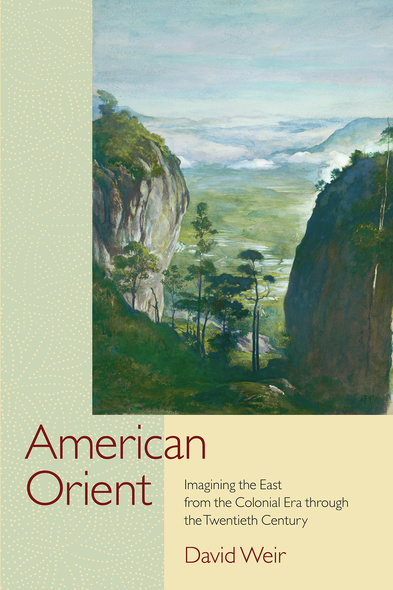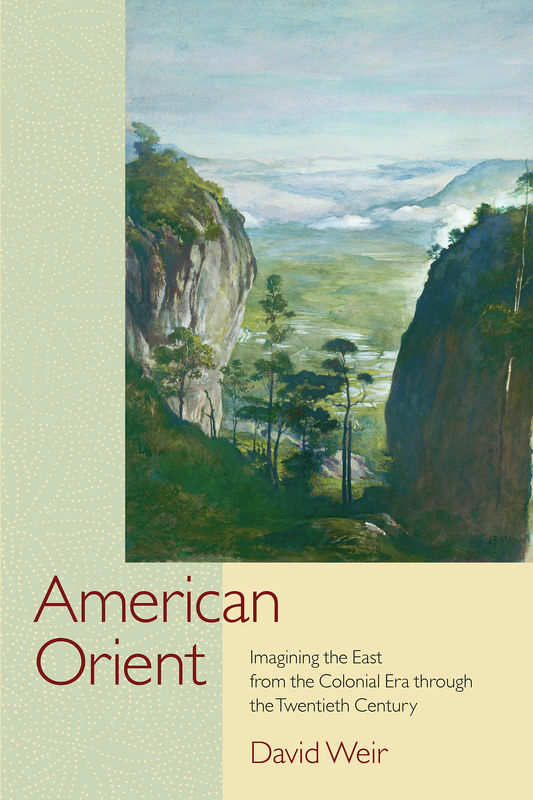Our shopping cart is currently down. To place an order, please contact our distributor, UTP Distribution, directly at utpbooks@utpress.utoronto.ca.
American Orient
Imagining the East from the Colonial Era through the Twentieth Century
By David Weir
University of Massachusetts Press
Surveying the American fascination with the Far East since the mid-eighteenth century, this book explains why the Orient had a fundamentally different meaning in the United States than in Europe or Great Britain. David Weir argues that unlike their European counterparts, Americans did not treat the East simply as a site of imperialist adventure; on the contrary, colonial subjugation was an experience that early Americans shared with the peoples of China and India.
In eighteenth-century America, the East was, paradoxically, a means of reinforcing the enlightenment values of the West: Franklin, Jefferson, and other American writers found in Confucius a complement to their own political and philosophical beliefs. In the nineteenth century, with the shift from an agrarian to an industrial economy, the Hindu Orient emerged as a mystical alternative to American reality. During this period, Emerson, Thoreau, and other Transcendentalists viewed the "Oriental" not as an exotic other but as an image of what Americans could be, if stripped of all the commercialism and materialism that set them apart from their ideal. A similar sense of Oriental otherness informed the aesthetic discoveries of the early twentieth century, as Pound, Eliot, and other poets found in Chinese and Japanese literature an artistic purity and intensity absent from Western tradition. For all of these figures the Orient became a complex fantasy that allowed them to overcome something objectionable, either in themselves or in the culture of which they were a part, in order to attain some freer, more genuine form of philosophical, religious, or artistic expression.
In eighteenth-century America, the East was, paradoxically, a means of reinforcing the enlightenment values of the West: Franklin, Jefferson, and other American writers found in Confucius a complement to their own political and philosophical beliefs. In the nineteenth century, with the shift from an agrarian to an industrial economy, the Hindu Orient emerged as a mystical alternative to American reality. During this period, Emerson, Thoreau, and other Transcendentalists viewed the "Oriental" not as an exotic other but as an image of what Americans could be, if stripped of all the commercialism and materialism that set them apart from their ideal. A similar sense of Oriental otherness informed the aesthetic discoveries of the early twentieth century, as Pound, Eliot, and other poets found in Chinese and Japanese literature an artistic purity and intensity absent from Western tradition. For all of these figures the Orient became a complex fantasy that allowed them to overcome something objectionable, either in themselves or in the culture of which they were a part, in order to attain some freer, more genuine form of philosophical, religious, or artistic expression.
I am in awe of the scope and structure of American Orient. As David Weir points out, bits of the story of American engagement with Asia have been told, in various disciplines. No one before him, however, has traced the entire chronological sweep, from the Founding Fathers to the latest New Age fads, giving balanced attention to politics, religion, scholarship, and art. The book seems to me a monumental achievement. It is timely, wise, idiosyncratic in only good ways, lively, well informed, fun to read.'—Christopher Benfey, author of The Great Wave: Gilded Age Misfits, Japanese Eccentrics, and the Opening of Old Japan
'Weir builds on [Edward Said's] analysis of the European 'otherizing' of the East by looking specifically at the role of the 'Orient' in American culture, history, and literature. . . . Written in an accessible style, the book is an excellent resource. . . . Highly recommended.'—Choice
'Weir argues that American cultural engagement with the East can be organized into a series of overlapping concerns--politics, theology, scholarship, aesthetics, modernism, and mass culture--the nature of which he periodically and judiciously qualifies.'—The New England Quarterly
'While American Orientalism is not a novel scholarly pursuit, the scope of Weir's book, not only in terms of periods covered, from the eighteenth to the twenty-first centuries, but also in the range of disciplines--philosophy, literature, poetry, religion, art, politics--is unprecedented. . . . Weir's scholarship is extremely learned, and yet his writing is readable and jargon-free.'—Studies in American Culture
'Weir's work should be noted for bringing together strains of American intellectual and religious history that have not been thoroughly explored. The temporal coverage of American Orient as well as the emphasis on India are also important contributions to the literature.'—Pacific Historical Review
'David Weir surveys a broad scope and diverse archive of thinkers who absorbed Asian elements to constitute themselves as American. He demonstrates how 'Eastern values, beliefs, and ideas are used to supplement American political, theological, or aesthetic interests.' The books strongest chapters draw on Weir's expertise in modernism to explore the Eastern engagements of a sequence of writers from the late nineteenth and early twentieth centuries.'—American Literature
David Weir is professor of comparative literature at the Cooper Union for the Advancement of Science and Art. He is author of Decadence and the Making of Modernism and Anarchy and Culture: The Aesthetic Politics of Modernism, both published by the University of Massachusetts Press.





